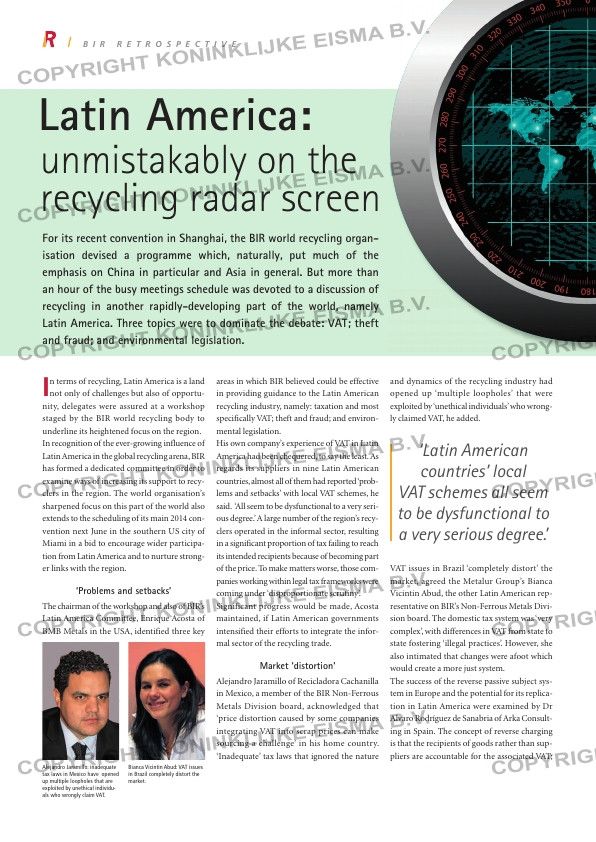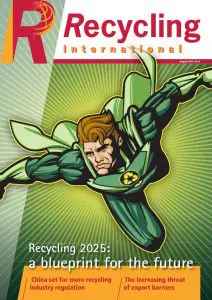Page 30 from: August 2013

Latin America:
For its recent convention in Shanghai, the BIR world recycling organ-
isation devised a programme which, naturally, put much of the
emphasis on China in particular and Asia in general. But more than
an hour of the busy meetings schedule was devoted to a discussion of
recycling in another rapidly-developing part of the world, namely
Latin America. Three topics were to dominate the debate: VAT; theft
and fraud; and environmental legislation.
In terms of recycling, Latin America is a land not only of challenges but also of opportu-
nity, delegates were assured at a workshop
staged by the BIR world recycling body to
underline its heightened focus on the region.
In recognition of the ever-growing influence of
Latin America in the global recycling arena, BIR
has formed a dedicated committee in order to
examine ways of increasing its support to recy-
clers in the region. The world organisation’s
sharpened focus on this part of the world also
extends to the scheduling of its main 2014 con-
vention next June in the southern US city of
Miami in a bid to encourage wider participa-
tion from Latin America and to nurture strong-
er links with the region.
‘Problems and setbacks’
The chairman of the workshop and also of BIR’s
Latin America Committee, Enrique Acosta of
BMB Metals in the USA, identified three key
areas in which BIR believed could be effective
in providing guidance to the Latin American
recycling industry, namely: taxation and most
specifically VAT; theft and fraud; and environ-
mental legislation.
His own company’s experience of VAT in Latin
America had been chequered, to say the least. As
regards its suppliers in nine Latin American
countries, almost all of them had reported ‘prob-
lems and setbacks’ with local VAT schemes, he
said. ‘All seem to be dysfunctional to a very seri-
ous degree.’ A large number of the region’s recy-
clers operated in the informal sector, resulting
in a significant proportion of tax failing to reach
its intended recipients because of becoming part
of the price. To make matters worse, those com-
panies working within legal tax frameworks were
coming under ‘disproportionate scrutiny’.
Significant progress would be made, Acosta
maintained, if Latin American governments
intensified their efforts to integrate the infor-
mal sector of the recycling trade.
Market ‘distortion’
Alejandro Jaramillo of Recicladora Cachanilla
in Mexico, a member of the BIR Non-Ferrous
Metals Division board, acknowledged that
‘price distortion caused by some companies
integrating VAT into scrap prices can make
sourcing a challenge’ in his home country.
‘Inadequate’ tax laws that ignored the nature
and dynamics of the recycling industry had
opened up ‘multiple loopholes’ that were
exploited by ‘unethical individuals’ who wrong-
ly claimed VAT, he added.
VAT issues in Brazil ‘completely distort’ the
market, agreed the Metalur Group’s Bianca
Vicintin Abud, the other Latin American rep-
resentative on BIR’s Non-Ferrous Metals Divi-
sion board. The domestic tax system was ‘very
complex’, with differences in VAT from state to
state fostering ‘illegal practices’. However, she
also intimated that changes were afoot which
would create a more just system.
The success of the reverse passive subject sys-
tem in Europe and the potential for its replica-
tion in Latin America were examined by Dr
Alvaro Rodríguez de Sanabria of Arka Consult-
ing in Spain. The concept of reverse charging
is that the recipients of goods rather than sup-
pliers are accountable for the associated VAT;
B I R R E T R O S P E C T I V E By Ian Martin
‘Latin American
countries’ local
VAT schemes all seem
to be dysfunctional to
a very serious degree.’
unmistakably on the
recycling radar screen
Alejandro Jaramillo: inadequate
tax laws in Mexico have opened
up multiple loopholes that are
exploited by unethical individu-
als who wrongly claim VAT.
Bianca Vicintin Abud: VAT issues
in Brazil completely distort the
market.
RI-6_BIR Latin America.indd 30 01-08-13 11:37



